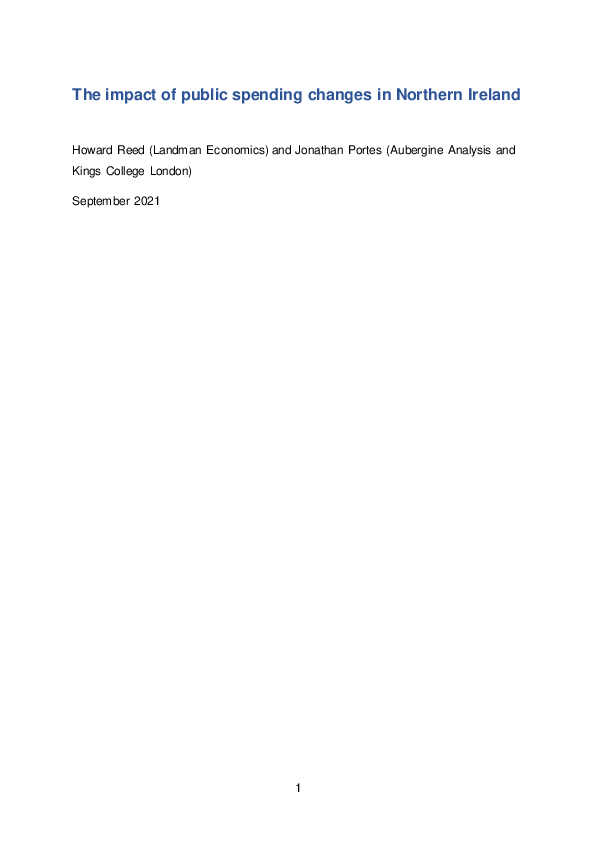The impact of public spending changes in Northern Ireland
The impact of public spending changes in Northern Ireland (Reed and Portes, 2021).
A previous report published by NIHRC in 2019 (Reed and Portes, 2019) performed a Cumulative Impact Assessment of the changes to the tax and social security system in Northern Ireland since May 2010, including all reforms planned up to the 2021-22 tax year.
This report extends that analysis and assesses the cumulative distributional impact of changes to ‘in-kind’ public services – in particular health, social care, education, early years and preschool services, and public transport and housing.
Note that this report does not include the distributional effects of additional spending specifically earmarked for Covid-19 in the Northern Ireland Department of Finance’s
Budget publications for 2020-21 and 2021-22. Instead, the economic impact and distributional implications of Covid-19 for Northern Ireland will be covered in a separate report to be published soon after this one.
Recommendations
Mitigating the negative impacts of public spending changes
We recommend that the Northern Ireland Executive:
- Significantly mitigate the disproportionate negative impacts on poorer households and protected groups of changes to the tax and welfare system and cuts to spending on specific public services such as housing, transport and social care for the elderly.
- Focus mitigation measures particularly on groups that have been badly affected by the combined impact of tax, social security and other public spending changes since 2010 – for example, lone parent families and adults aged under 25.
- Take into account in the future spending plans the likely impact on protected groups and the impacts for poorer households and protected groups who have lost out from changes since 2010.
- Require that future Budget plans from the Department of Finance are accompanied by an equality impact assessment (EIA). The EIAs should incorporate a CIA of the impact on protected groups, showing how distributional impacts vary across groups; analyse and explain any major disparities in outcomes that adversely impact protected groups; and take into account the impacts for poorer households of further changes in spending.
- Publish a detailed explanation of the process by which they will ensure that the Spending Review and spending plans are fully compliant with section 75 of the Northern Ireland Act 1998; demonstrating that any regressive measures are temporary, necessary, proportionate and non-discriminatory and do not undercut a core minimum level of protection and put in place any mitigating measures required to safeguard people’s rights.
- Ensure that these analyses by each government are publicly accessible and subject to meaningful scrutiny by the Northern Ireland Assembly, the public and protected groups that may be adversely affected by the decisions.
- Improving data for impact assessments of public spending changes
- In order to improve the quality of data for CIAs on public spending, we recommend that the Northern Ireland Executive (working with the UK Government where necessary):
- Makes available more information on the usage of various public services in Northern Ireland, including on social care services; Sure Start; legal aid services; publicly funded recreational facilities (for example, museums and galleries, parks etc.); and fire services.
- Improve the quality and availability of data on children’s usage of health services.
- Publish more detailed analysis where data are collected on protected characteristics and take steps to redress this omission where they are not.
- Where data are lacking for particular groups, e.g. people from ethnic minorities in Northern Ireland, increase, boost or pool samples as necessary.
The Northern Ireland Human Rights Commission would like to thank Howard Reed (Landman Economics) and Jonathan Portes (Aubergine Analysis and Kings College London) for their work on this report.

Your browser is out-of-date!
Update your browser to view this website correctly. Update my browser now